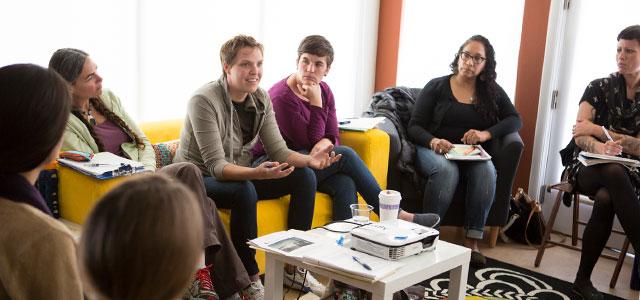
A recruitment session for potential doulas (photo by Elisabeth Fall)
Novel Doula Training for Incarcerated Women and Those at Risk Expands and Grows
Faculty and students from the UC San Francisco schools of nursing and medicine had one main goal when they created a program to provide doula services to women incarcerated at San Francisco County Jail.
It was to offer “loving, respectful and empowered” birth and postpartum support to these women. Essentially, doulas are trained nonclinical birthing companions – a role that has existed for centuries in nearly every cultural tradition.
But when their program expanded to Alameda County in 2014, it adopted an exciting and ambitious new mission aligned with statewide efforts to reduce recidivism among formerly incarcerated women and men.
Keeping Women Out of Jail
The Alameda County-based East Bay Community Birth Support Project provided comprehensive doula training to 16 women – who were all low-income and had previously been incarcerated. The idea was to give these women strong incentives to stay out of jail by giving them the skills and self-esteem necessary to earn a living and, if they chose, to further their education and pursue other careers, including in health care.
 Monica McLemore So far, none of the women in this novel vocational program has returned to jail, according to Monica McLemore, an assistant professor in the Department of Family Health Care Nursing, who provides logistical support for the project and for evaluating the outcomes.
Monica McLemore So far, none of the women in this novel vocational program has returned to jail, according to Monica McLemore, an assistant professor in the Department of Family Health Care Nursing, who provides logistical support for the project and for evaluating the outcomes.
Indeed, the program has yielded more far-reaching results. As of April 2015, 14 of the 16 doulas supported over 60 families in birth, and a growing awareness about the program has made them in demand throughout the Bay Area, according to an evaluation of the project published last year in the Journal of Obstetric, Gynecologic & Neonatal Nursing.
New Grant to Sustain the Program, Create a Collective
That success helped the project earn an additional six-month, $63,000 grant to help these trainees develop a sustainable, long-term way to continue working as doulas and to provide free services to low-income families.
With the grant, they will create a nonprofit collective that will allow them to raise money to support program costs, market their services to hospitals and other health care centers and cover one another if, for example, one doula can’t meet with a client because she can’t get child care or is with another client.
“It’s a win-win situation,” McLemore says. “It will further empower the doulas to be funded, and it will help them learn the fiscal, investment and money management skills to make the project sustainable. It will allow them to learn to run and manage an organization.”
The East Bay Community Birth Support Project is a UCSF collaboration with the original San Francisco-based Birth Justice Project and the Oakland-based Black Women Birthing Justice collective. The evaluation of the East Bay birth project was co-authored by Birth Justice Project co-founders Nicole Sata, a master’s entry student in the School of Nursing, and Darcy Stanley, a registered nurse in Berkeley, as well as McLemore and Julia Chinyere Oparah, a member of the Black Women Birthing Justice organization and a professor of ethnic studies at Mills College.
After training as doulas, the evaluation showed, the participants enjoyed an increased sense of confidence in their professional abilities. One finished a bachelor’s degree, and another has been accepted to a school in Texas to study midwifery. Seven continued to be paid for their doula work, and five work as volunteers for the San Francisco General Hospital Volunteer Doula Program.
Forming the collective can be “the next step,” McLemore says. “They are using doula work as a stepping stone to economic stability.”



